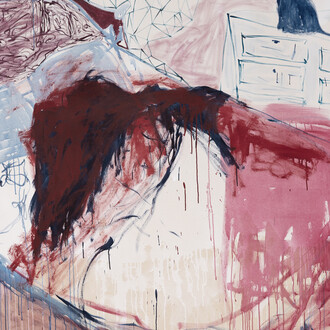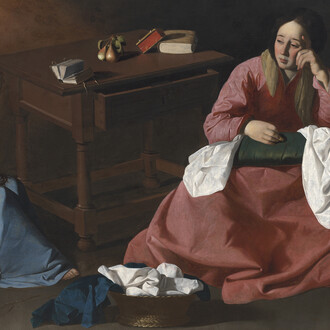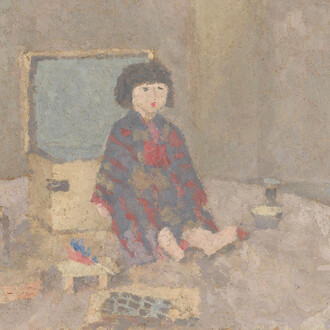The Foundling Museum’s autumn exhibition, A grand chorus: the power of music, will explore the life-affirming power of music through the lens of Handel’s iconic ‘Hallelujah Chorus’, exploring music as a positive force for empowering individuals and communities.
Bringing together original handwritten scores, librettos and musical instruments, as well as paintings, drawings, photographs, video and audio recordings, and other archival material spanning three centuries, the exhibition will take a fresh look at the ‘Hallelujah Chorus’ – its origins and enduring popularity – as well as reflecting on the impact of music on the lives of former Foundlings and care-experienced individuals.
The exhibition will also showcase a major sound and video installation by Mikhail Karikis, We are together because... (2025), the first time the work has been presented in the UK. Featuring a powerful anthem for a new generation, created with 52 young people from a community-led music school on the outskirts of Lisbon, Karikis’s work can be imagined as a contemporary counterpart to the ‘Hallelujah Chorus’. The work also pays homage to another composer, Pauline Oliveros, who described listening as an act of empathy and environmental awareness.
Joyful, hopeful, uplifting and instantly recognisable, the ‘Hallelujah Chorus’ is one of the most popular pieces of Western choral music in the world. Originally composed as part of his famous Messiah oratorio, Handel later incorporated the ‘Hallelujah Chorus’ into an anthem he created specially for the Foundling Hospital that he premiered in 1749 to help raise money for the charitable institution.
Composed at a time of social upheaval and uncertainty, more than 275 years after its first performance the ‘Hallelujah Chorus’ remains a beacon of optimism, celebration, and unity that continues to delight and enthrall performers and audiences alike.
The story of the ‘Hallelujah Chorus’
The exhibition will explore the origins of the ‘Hallelujah Chorus’, tracing the history of performances from grassroots to flash mobs, from the 1700s to the present day, alongside the extensive geographical popularity and diverse range of interpretations crossing musical styles and cultures, ranging from choirs of a thousand voices to gospel, soul, folk and trance versions. Highlight objects will include Handel’s original handwritten score for the Foundling Hospital Anthem (1749), an early shellac sound recording of the ‘Hallelujah Chorus’, a 19th-century musical box featuring the ‘Hallelujah Chorus’, a lithograph showing the 19th-century fad for large-scale performances of the Chorus, and footage from one of the world’s largest virtual performances of the ‘Hallelujah Chorus’, which took place during lockdown in 2020 with 3,600 voices from around the world as well as 4 professional soloists, and a 9-member baroque orchestra, who all recorded their parts in isolation.
Music at the Foundling Hospital and beyond
Highlighting the importance of music in the lives of former Foundlings the exhibition will reveal individual stories and experiences of music as a source of enlightenment, refuge and transformation, including voices from the past and present. Archival recordings reveal testimonies from former pupils who grew up at the Foundling Hospital in Berkhamsted during the 1930s and 1940s, speaking about the significance of music to their experiences there, whilst a painting of a Foundling choir from 1900 shows how firmly music was embedded in education at the Foundling Hospital, and even attracted audiences to hear them sing at concerts and services in the Chapel. Among the stories are those of several children who went on to have distinguished musical careers which all began with their first encounters, and access to music through the Foundling Hospital; from singers and performers to a teacher at the Royal Academy of Music and a highly skilled instrument-maker.
The power of singing and the collective voice
Presented in the UK for the first time, We are together because... is a major sound and video installation by Greek/British artist Mikhail Karikis. Created with a group of young people in Lisbon, the work explores the potential of singing and the collective voice to empower individuals and communities, providing a positive force with the capacity to inspire hope, courage, compassion and unity in polarised times. Karikis has also been commissioned to develop a related live performance of collective singing with young participants from London that will be presented at the Foundling Museum in 2026.
“Music sparks profound emotional connections between friends, strangers, and across historical eras. Experiencing music brings people together and can generate a sense of belonging that is both intimate and collective. Music serves as a universal form of communication beyond cultural and language differences, created to intentionally stir emotions, create shared experiences, and even influence social change.” Emma Ridgway, Deborah Loeb Brice Director, Foundling Museum.
This exhibition marks the beginning of a new programme focusing on Music & Care at the Foundling Museum, investigating the impact music has on us as individuals and as a society.
Over the next three years, this strand will enhance the relevance of the Museum’s music collection, exhibitions and events by fostering emotionally enriching experiences that deepen people’s engagement with lived experiences of children’s social care.
(This exhibition is supported by the Director’s Circle)
















